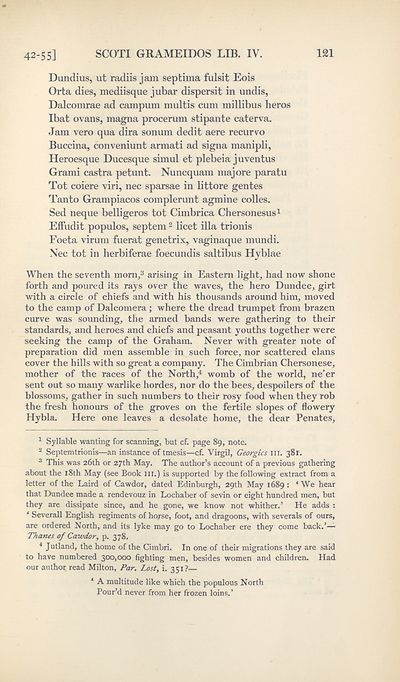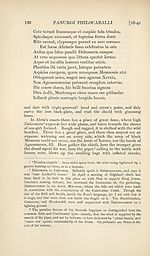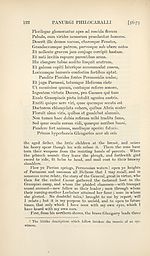Series 1 > Grameid: an heroic poem descriptive of the campaign of Viscount Dundee in 1689, and other pieces
(192) Page 121
Download files
Complete book:
Individual page:
Thumbnail gallery: Grid view | List view

42-55]
SCOTI GRAMEIBOS LIB. IV.
121
Dundius, ut radiis jam septima fulsit Eois
Orta dies, mediisque jubar dispersit in undis,
Dalcomrae ad campum multis cum millibus heros
Ibat ovans, magna procerum stipante caterva.
Jam vero qua dira sonum dedit aere recurvo
Buccina, conveniunt armati ad signa manipli,
Heroesque Ducesque simul et plebeia juventus
Grami castra petunt. Nuncquam majore paratu
Tot coiere viri, nec sparsae in littore gentes
Tanto Grampiacos complerunt agmine colles.
Sed neque belligeros tot Cimbrica Chersonesus1
Effudit populos, septem2 licet ilia trionis
Foeta virum fuerat genetrix, vaginaque mundi.
Nec tot in herbiferae foecundis saltibus Hyblae
When the seventh mom,3 arising in Eastern light, had now shone
forth and poured its rays over the waves, the hero Dundee, girt
with a circle of chiefs and with his thousands around him, moved
to the camp of Dalcomera; where the dread trumpet from brazen
curve was sounding, the armed bands were gathering to their
standards, and heroes and chiefs and peasant youths together were
seeking the camp of the Graham. Never with greater note of
preparation did men assemble in such force, nor scattered clans
cover the hills with so great a company. The Cimbrian Chersonese,
mother of the races of the North,4 womb of the world, ne’er
sent out so many warlike hordes, nor do the bees, despoilers of the
blossoms, gather in such numbers to their rosy food when they rob
the fresh honours of the groves on the fertile slopes of flowery
Hybla. Here one leaves a desolate home, the dear Penates,
1 Syllable wanting for scanning, but cf. page 89, note.
2 Septemtrionis—an instance of tmesis—cf. Virgil, Georgies in. 381.
3 This was 26th or 27th May. The author’s account of a previous gathering
about the 18th May (see Book ill.) is supported by the following extract from a
letter of the Laird of Cawdor, dated Edinburgh, 29th May 1689: ‘ We hear
that Dundee made a rendevouz in Lochaber of sevin or eight hundred men, but
they are dissipate since, and he gone, we know not whither.’ He adds :
‘ Severall English regiments of horse, foot, and dragoons, with severals of ours,
are ordered North, and its lyke may go to Lochaber ere they come back.’—
Thanes of Cawdor, p. 378.
4 Jutland, the home of the Cimbri. In one of their migrations they are said
to have numbered 300,000 fighting men, besides women and children. Had
our author read Milton, Par. Lost, i. 351?
‘ A multitude like which the populous North
Pour’d never from her frozen loins.’
SCOTI GRAMEIBOS LIB. IV.
121
Dundius, ut radiis jam septima fulsit Eois
Orta dies, mediisque jubar dispersit in undis,
Dalcomrae ad campum multis cum millibus heros
Ibat ovans, magna procerum stipante caterva.
Jam vero qua dira sonum dedit aere recurvo
Buccina, conveniunt armati ad signa manipli,
Heroesque Ducesque simul et plebeia juventus
Grami castra petunt. Nuncquam majore paratu
Tot coiere viri, nec sparsae in littore gentes
Tanto Grampiacos complerunt agmine colles.
Sed neque belligeros tot Cimbrica Chersonesus1
Effudit populos, septem2 licet ilia trionis
Foeta virum fuerat genetrix, vaginaque mundi.
Nec tot in herbiferae foecundis saltibus Hyblae
When the seventh mom,3 arising in Eastern light, had now shone
forth and poured its rays over the waves, the hero Dundee, girt
with a circle of chiefs and with his thousands around him, moved
to the camp of Dalcomera; where the dread trumpet from brazen
curve was sounding, the armed bands were gathering to their
standards, and heroes and chiefs and peasant youths together were
seeking the camp of the Graham. Never with greater note of
preparation did men assemble in such force, nor scattered clans
cover the hills with so great a company. The Cimbrian Chersonese,
mother of the races of the North,4 womb of the world, ne’er
sent out so many warlike hordes, nor do the bees, despoilers of the
blossoms, gather in such numbers to their rosy food when they rob
the fresh honours of the groves on the fertile slopes of flowery
Hybla. Here one leaves a desolate home, the dear Penates,
1 Syllable wanting for scanning, but cf. page 89, note.
2 Septemtrionis—an instance of tmesis—cf. Virgil, Georgies in. 381.
3 This was 26th or 27th May. The author’s account of a previous gathering
about the 18th May (see Book ill.) is supported by the following extract from a
letter of the Laird of Cawdor, dated Edinburgh, 29th May 1689: ‘ We hear
that Dundee made a rendevouz in Lochaber of sevin or eight hundred men, but
they are dissipate since, and he gone, we know not whither.’ He adds :
‘ Severall English regiments of horse, foot, and dragoons, with severals of ours,
are ordered North, and its lyke may go to Lochaber ere they come back.’—
Thanes of Cawdor, p. 378.
4 Jutland, the home of the Cimbri. In one of their migrations they are said
to have numbered 300,000 fighting men, besides women and children. Had
our author read Milton, Par. Lost, i. 351?
‘ A multitude like which the populous North
Pour’d never from her frozen loins.’
Set display mode to:
![]() Universal Viewer |
Universal Viewer | ![]() Mirador |
Large image | Transcription
Mirador |
Large image | Transcription
Images and transcriptions on this page, including medium image downloads, may be used under the Creative Commons Attribution 4.0 International Licence unless otherwise stated. ![]()
| Scottish History Society volumes > Series 1 > Grameid: an heroic poem descriptive of the campaign of Viscount Dundee in 1689, and other pieces > (192) Page 121 |
|---|
| Permanent URL | https://digital.nls.uk/126597861 |
|---|
| Attribution and copyright: |
|
|---|
| Description | Over 180 volumes, published by the Scottish History Society, containing original sources on Scotland's history and people. With a wide range of subjects, the books collectively cover all periods from the 12th to 20th centuries, and reflect changing trends in Scottish history. Sources are accompanied by scholarly interpretation, references and bibliographies. Volumes are usually published annually, and more digitised volumes will be added as they become available. |
|---|


